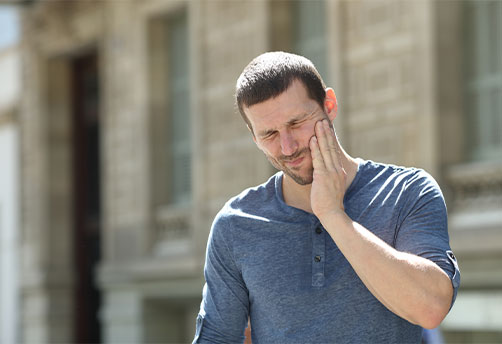

30
Jul
Addressing Cracks in Teeth at Boynton Beach Dentistry

Cracks in tooth enamel are often vertical and so fine that patients do not notice them. You may have a hairline fracture that is not visible to the naked eye. It may not even show up on an x-ray. Unless there is associated pain, you may never become aware of it. Other cracks are visible. Even if you aren’t aware of them when you look in the mirror, a dental clinician is trained to see them and understand their causes and associated oral health risks. With today’s intraoral cameras and digital technology, we can show you cracks and easily help you understand why they have occurred, whether they need treatment, and the restorative and cosmetic treatments available.
What causes a tooth to crack?
There are multiple reasons why cracks develop. Many people with cracked teeth have one or more of these events occurring on a regular basis:
• Biting and chewing on hard food, ice, and objects
• Grinding during sleep (bruxing) and clenching under stress
• Uneven chewing pressure
• Upper and lower teeth interfering with each other due to their position
• Normal chewing forces if the tooth structure has been previously weakened
Less frequently occurring causes are:
• An accidental blow
• Exposure to extreme hot and cold temperatures
“Many people don’t realize that fractures develop when they grind their teeth together during sleep,” says Dr. Jamie Alexander of Boynton Beach, FL. “Most people brux at night and are unaware they are doing it. But, we dentists see the signs of wear on the occlusal surfaces of teeth and see fine stress fractures every day. Many patients also complain of jaw muscle tenderness, which is a sign of bruxism or clenching. This wear and tear on teeth and jaw joints accelerate the need for dental restorations and other therapeutic treatments. Although very fine crazing in dental enamel does not typically require treatment, sometimes careful diagnosis reveals this is the cause of reported dental pain.”
Treatment for dental cracks varies.
When a tooth is cracked, there is more susceptibility for breakage, tooth sensitivity, dental caries and pulp infection. Even small cracks can allow air to reach sensitive nerves and allow oral bacteria to take erosive hold. But, knowing if treatment is necessary, beneficial, or not needed takes skill and judgment. Dr. Jamie Alexander of Boynton Beach, FL, has advanced training in the diagnosis and treatment of dental problems, including cracked teeth, occlusal problems that precipitate cracks on teeth, and temporomandibular joint disorders (TMD). If you have a cracked tooth, you can trust Dr. Alexander to perform a careful diagnosis before recommending treatment.
“Often patients assume dental pain is caused by infection or hairline cracks in teeth,” says Dr. Alexander. “Not every painful tooth needs endodontic (root canal) therapy and a crown. Often, nighttime teeth grinding, stress clenching, and occlusal biting and chewing forces, inflame the periodontal ligaments surrounding a tooth. Sometimes, a temporary sinus infection is the root cause of pain. It’s also common for patients to not know which tooth the pain is coming from. An accurate diagnosis may include an x-ray.”
Experience the Difference at Boynton Beach Dentistry
Dr. Alexander will fully inform you about the treatment options that are appropriate for your situation and assist you in making decisions that are right for you. “Treatment can range from wearing an occlusal nightguard during sleep to orthodontic treatment like Invisalign… to a slight alteration of the occlusal surfaces… to composite bonding to cover a fissure… to an onlay (partial crown)… to a full crown,” says Dr. Alexander. “And if a tooth is no longer viable and needs to be removed, there are options for replacing it with a prosthetic tooth via crown and bridge treatment or implant treatment.”
Preventive and conservative restorative dentistry will extend the life of your teeth and dental restorations, saving you from preventable discomfort, hassle, and the cost of more extensive treatment. If you are experiencing dental pain of any kind in the Boynton Beach area, have TMD symptoms, have been told you have cracked teeth and need restorative treatment, or have any oral health concerns including the appearance of your smile, we invite you to give our office a call. Whether this is a first exam and opinion or a second exam and opinion, Dr. Jamie Alexander is happy to be of assistance.




